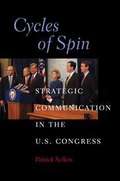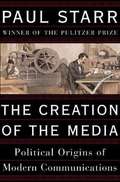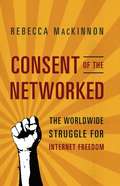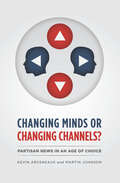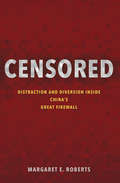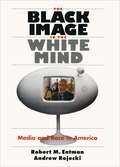Special Collections
Goldsmith Book Prize
Description: The Goldsmith Book Prize is awarded to the trade and academic book published in the last 24 months that best fulfills the objective of improving democratic governance by examining of the intersection between the media, politics and public policy. #award
- Table View
- List View
Cycles of Spin
by Patrick SellersHow do politicians try to shape their news coverage? Sellers examines strategic communication campaigns in the U.S. Congress. He argues that these campaigns create cycles of spin: leaders create messages, rank-and-file legislators decide whether to promote those messages, journalists decide whether to cover the messages, and any coverage feeds back to influence the policy process. These four stages are closely related; decisions at one stage influence those at another. Sellers uses diverse evidence, from participant observation and press secretary interviews, to computerized content analysis and vector auto regression. The result is a comprehensive and unprecedented examination of politicians' promotional campaigns and journalists' coverage of those campaigns. Countering numerous critics of spin, Sellers offers the provocative argument that the promotional messages have their origins in the actual policy preferences of members of Congress. The campaigns to promote these messages thus can help the public learn about policy debates in Congress.
The Creation of the Media
by Paul StarrAmerica's leading role in today's information revolution may seem simply to reflect its position as the world's dominant economy and most powerful state. But by the early nineteenth century, when the United States was neither a world power nor a primary center of scientific discovery, it was already a leader in communications-in postal service and newspaper publishing, then in development of the telegraph and telephone networks, later in the whole repertoire of mass communications.
In this wide-ranging social history of American media, from the first printing press to the early days of radio, Paul Starr shows that the creation of modern communications was as much the result of political choices as of technological invention. His original historical analysis reveals how the decisions that led to a state-run post office and private monopolies on the telegraph and telephone systems affected a developing society. He illuminates contemporary controversies over freedom of information by exploring such crucial formative issues as freedom of the press, intellectual property, privacy, public access to information, and the shaping of specific technologies and institutions. America's critical choices in these areas, Starr argues, affect the long-run path of development in a society and have had wide social, economic, and even military ramifications. The Creation of the Media not only tells the history of the media in a new way; it puts America and its global influence into a new perspective.
Consent of the Networked
by Rebecca MackinnonThe Internet was going to liberate us, but in truth it has not. For every story about the web's empowering role in events such as the Arab Spring, there are many more about the quiet corrosion of civil liberties by companies and governments using the same digital technologies we have come to depend upon.
Sudden changes in Facebook's features and privacy settings have exposed identities of protestors to police in Egypt and Iran. Apple removes politically controversial apps at the behest of governments as well as for its own commercial reasons. Dozens of Western companies sell surveillance technology to dictatorships around the world.
Google struggles with censorship demands from governments in a range of countries--many of them democracies--as well as mounting public concern over the vast quantities of information it collects about its users.
In Consent of the Networked, journalist and Internet policy specialist Rebecca MacKinnon argues that it is time to fight for our rights before they are sold, legislated, programmed, and engineered away. Every day, the corporate sovereigns of cyberspace make decisions that affect our physical freedom--but without our consent.
Yet the traditional solution to unaccountable corporate behavior--government regulation--cannot stop the abuse of digital power on its own, and sometimes even contributes to it.
A clarion call to action, Consent of the Networked shows that it is time to stop arguing over whether the Internet empowers people, and address the urgent question of how technology should be governed to support the rights and liberties of users around the world.
Comparing Media Systems
by Daniel C. Hallin and Paolo ManciniComparing Media Systems Beyond the Western World offers a broad exploration of the conceptual foundations for comparative analysis of media and politics globally. It takes as its point of departure the widely used framework of Daniel C. Hallin and Paolo Mancini's Comparing Media Systems, exploring how the concepts and methods of their analysis do and do not prove useful when applied beyond the original focus of their "most similar systems" design and the West European and North American cases it encompassed. It is intended both to use a wider range of cases to interrogate and clarify the conceptual framework of Comparing Media Systems and to propose new models, concepts, and approaches that will be useful for dealing with non-Western media systems and with processes of political transition. Comparing Media Systems Beyond the Western World covers, among other cases, Brazil, China, Israel, Lebanon, Lithuania, Poland, Russia, Saudi Arabia, South Africa, and Thailand.
Changing Minds or Changing Channels?
by Martin Johnson and Kevin ArceneauxWe live in an age of media saturation, where with a few clicks of the remote--or mouse--we can tune in to programming where the facts fit our ideological predispositions. But what are the political consequences of this vast landscape of media choice?
Partisan news has been roundly castigated for reinforcing prior beliefs and contributing to the highly polarized political environment we have today, but there is little evidence to support this claim, and much of what we know about the impact of news media come from studies that were conducted at a time when viewers chose from among six channels rather than scores.
Through a series of innovative experiments, Kevin Arceneaux and Martin Johnson show that such criticism is unfounded. Americans who watch cable news are already polarized, and their exposure to partisan programming of their choice has little influence on their political positions. In fact, the opposite is true: viewers become more polarized when forced to watch programming that opposes their beliefs.
A much more troubling consequence of the ever-expanding media environment, the authors show, is that it has allowed people to tune out the news: the four top-rated partisan news programs draw a mere three percent of the total number of people watching television.
Overturning much of the conventional wisdom, "Changing Minds or Changing Channels?" demonstrate that the strong effects of media exposure found in past research are simply not applicable in today's more saturated media landscape.
Censored
by Margaret E. RobertsA groundbreaking and surprising look at contemporary censorship in China
As authoritarian governments around the world develop sophisticated technologies for controlling information, many observers have predicted that these controls would be ineffective because they are easily thwarted and evaded by savvy Internet users. In Censored, Margaret Roberts demonstrates that even censorship that is easy to circumvent can still be enormously effective.
Taking advantage of digital data harvested from the Chinese Internet and leaks from China's Propaganda Department, this important book sheds light on how and when censorship influences the Chinese public.Roberts finds that much of censorship in China works not by making information impossible to access but by requiring those seeking information to spend extra time and money for access.
By inconveniencing users, censorship diverts the attention of citizens and powerfully shapes the spread of information. When Internet users notice blatant censorship, they are willing to compensate for better access.
But subtler censorship, such as burying search results or introducing distracting information on the web, is more effective because users are less aware of it. Roberts challenges the conventional wisdom that online censorship is undermined when it is incomplete and shows instead how censorship's porous nature is used strategically to divide the public.
Drawing parallels between censorship in China and the way information is manipulated in the United States and other democracies, Roberts reveals how Internet users are susceptible to control even in the most open societies. Demonstrating how censorship travels across countries and technologies, Censored gives an unprecedented view of how governments encroach on the media consumption of citizens.
The Black Image in the White Mind
by Entman and Robert M. and Rojecki and AndrewLiving in a segregated society, white Americans learn about African Americans not through personal relationships but through the images the media show them. The Black Image in the White Mind offers the most comprehensive look at the intricate racial patterns in the mass media and how they shape the ambivalent attitudes of Whites toward Blacks.
Using the media, and especially television, as barometers of race relations, Robert Entman and Andrew Rojecki explore but then go beyond the treatment of African Americans on network and local news to incisively uncover the messages sent about race by the entertainment industry-from prime-time dramas and sitcoms to commercials and Hollywood movies.
While the authors find very little in the media that intentionally promotes racism, they find even less that advances racial harmony. They reveal instead a subtle pattern of images that, while making room for Blacks, implies a racial hierarchy with Whites on top and promotes a sense of difference and conflict.
Commercials, for example, feature plenty of Black characters. But unlike Whites, they rarely speak to or touch one another. In prime time, the few Blacks who escape sitcom buffoonery rarely enjoy informal, friendly contact with White colleagues-perhaps reinforcing social distance in real life.
Entman and Rojecki interweave such astute observations with candid interviews of White Americans that make clear how these images of racial difference insinuate themselves into Whites' thinking.
Despite its disturbing readings of television and film, the book's cogent analyses and proposed policy guidelines offer hope that America's powerful mediated racial separation can be successfully bridged.
